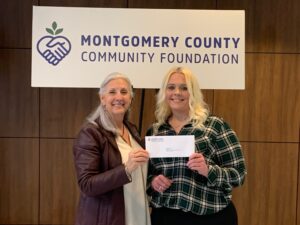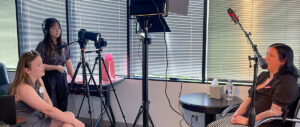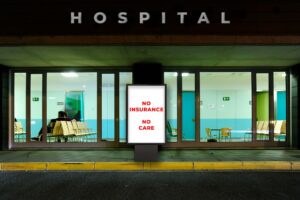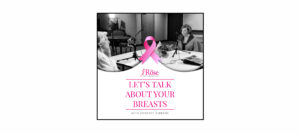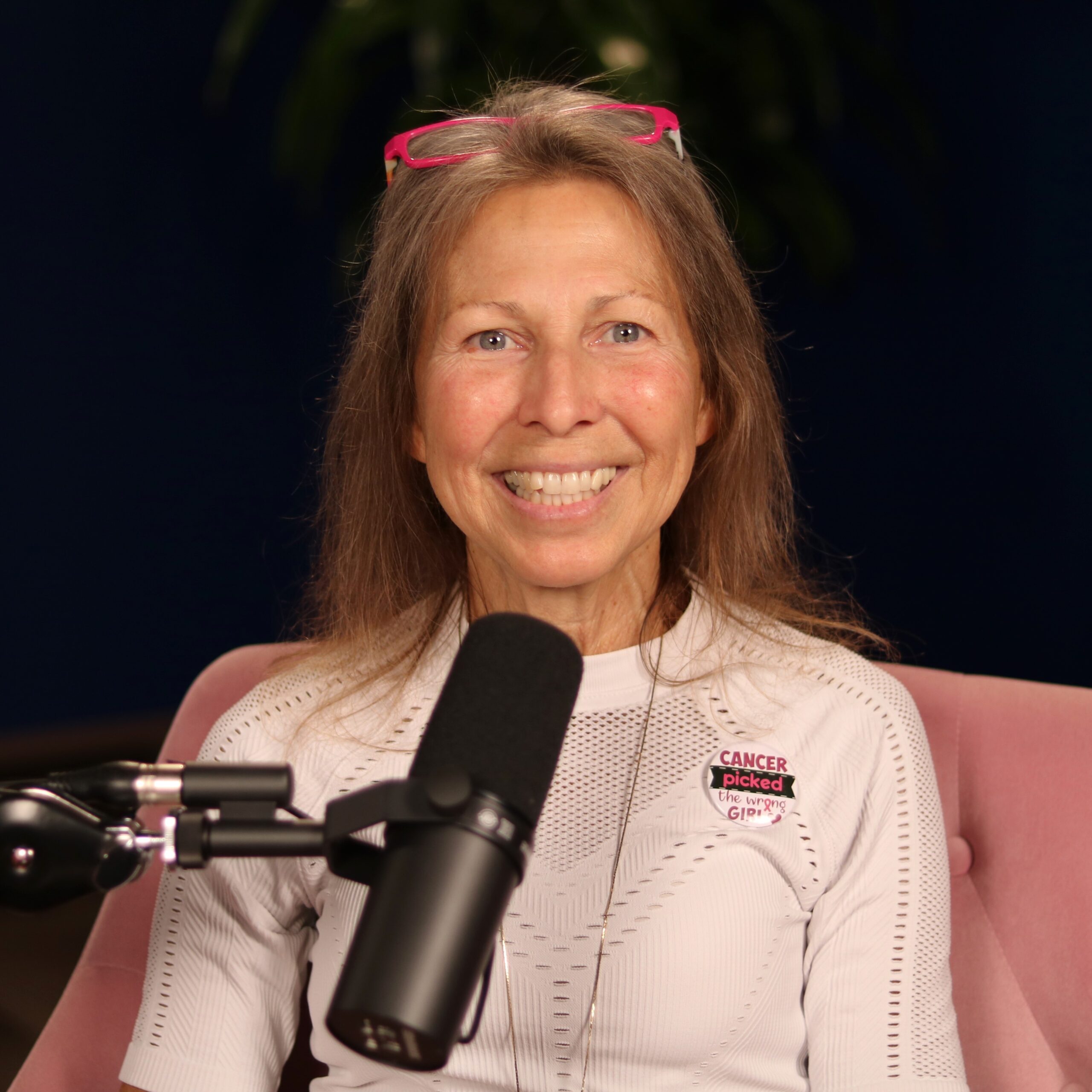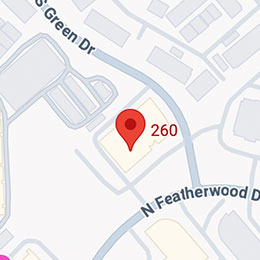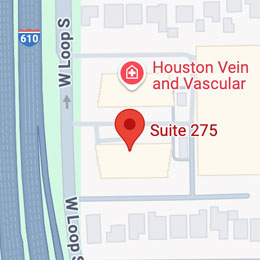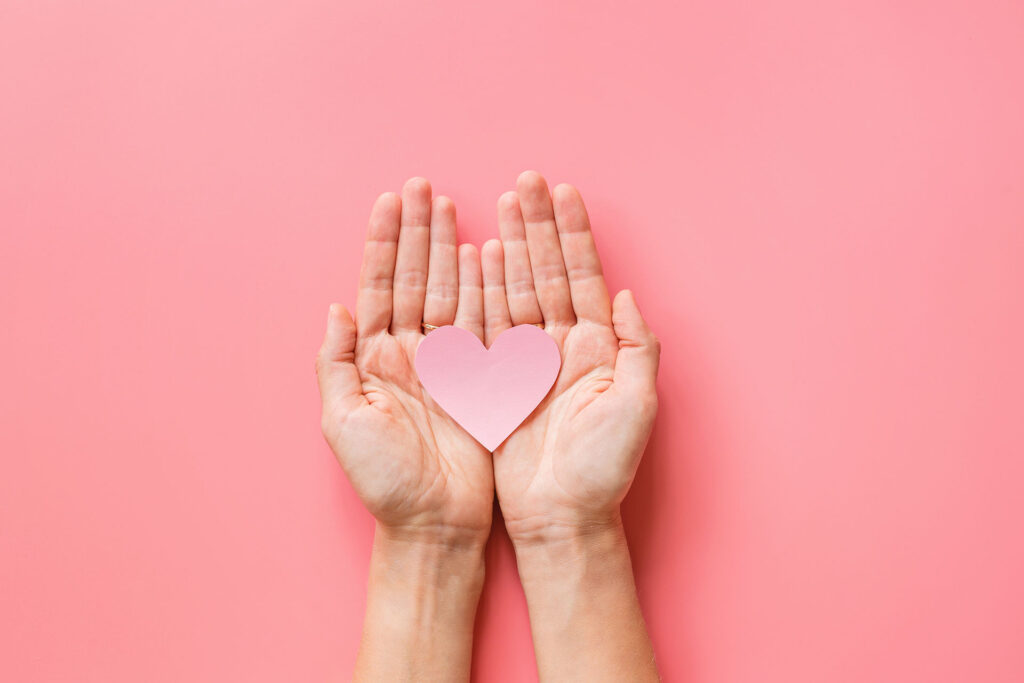Dorothy: [00:00:00] Twenty years ago, Joanne Patterson faced stage four breast cancer, was going through a divorce, was uninsured, and had to face the other reality that she had to survive to raise her four daughters. And raise them she did. Originally she was told the small nodule in her breast was fibrous tissue. And besides, she was so young, it wasn’t anything to worry about.
Of course, that tiny nodule grew into a massive tumor. So now, fast forward to a time when her young daughter discovered a lump in her breast and was told the exact same thing. That it was only fibrous tissue. Nothing to worry about. Joanne knew she needed help, and she needed to find it fast. And that is what led her to The Rose. Today you will hear of a life filled with incredible triumph as well as devastating tragedy and how this woman [00:01:00] has learned, in spite of it all, to appreciate each and every day. Her unstoppable determination is bound to make you smile.
When you subscribe to our show, you help us grow. Someone you know may need to hear this story. So please, share with your family and friends. And consider supporting our mission. Your donation can help save the life of an uninsured woman.
Let’s Talk About Your Breast. A different kind of podcast presented to you by The Rose. A breast center of excellence and a Texas treasure. You’re gonna hear frank discussions about tough topics, and you’re gonna learn why knowing about your breast could save your life.
Joanne, thank you so much for being with us today and for coming so far to do this interview.
Joanne: Thank you so much. I appreciate you having me. I feel honored, blessed, and [00:02:00] grateful.
Dorothy: Oh, that’s so, so kind of you. Now, Joanne, you have to tell us how you got reconnected to The Rose after 20 years of coming to us for, you know, for your daughters. And we’re going to talk about that in a minute. But how, how did you get reconnected?
Joanne: In about two years ago, March the 11th, the 12th, my house burned to the ground. And, um, everything just about materialistic went. My grandson. Uh, five years old. I couldn’t get him out, but I managed to get my two granddaughters out. And I had things from Peggy at my house and, uh, it was gone. And just probably within the past three months, I found her on Facebook and she wanted to be my friend and I didn’t know how to make anybody my friend, but I knew how to accept a friendship. So I said, yes, yes, yes, I’ll be your [00:03:00] friend. And we started texting and reconnected. It was amazing.
Dorothy: So Peggy, at the time that you came to us, was our sponsorship coordinator.
Joanne: Okay.
Dorothy: And that is Dr. Peggy Connor, and she continues to be with us even to today.
Joanne: Yes.
Dorothy: Still working with our breast and cervical cancer program. But that’s an amazing story. Twenty, twenty years in between. That, that is just incredible.
Joanne: It is.
Dorothy: So now go back in time to that twenty years ago and tell us about your diagnosis. How did you find it? What happened? How old were you? Are you okay with age?
Joanne: Yes, absolutely. I’m forever 39, but I just happened to be almost 46 then.
Dorothy: So young.
Joanne: Quite young, I thought, yeah. And for someone who Uh, lived a basically clean lifestyle. Didn’t drink, didn’t smoke, didn’t do drugs.
Dorothy: No sugar.
Joanne: Uh, no sugar. No white refined sugar. You know, honey was basically maple [00:04:00] syrup, that kind of thing.
Dorothy: Right.
Joanne: Um, I did a, a vegetarian diet to a certain extent. No red meat. You know, fish, chicken, that kind of thing we ate.
Dorothy: Right.
Joanne: And raised the kids that way. So, I felt something in my right breast one day and, you know, I thought, eh, I’ll see if it’s still there, you know, in a few weeks. And it was, and then it was still there like a month or so later. So I went to the doctor and he said, oh, it’s fibroids. And I thought, oh, okay, nothing really to worry about. So time went on and about, two years later, this thing started growing out of my right breast.
Dorothy: Oh my gosh, so it actually had broken the skin?
Joanne: Yeah.
Dorothy: Oh my.
Joanne: And it was oozing stuff, and I thought, okay, I’ve read about fibroids, but I think this is maybe something a little different. So my husband agreed, you know, that that definitely [00:05:00] was not how it should be. And so I went to a local doctor, not the same one.
And he said, yeah, that looks serious. He said, I’m going to refer you to an oncologist. And I said, sounds great. Don’t know what an oncologist is, but whatever you think. And so I went to the oncologist with my mom and a couple of my sisters by my side. And he said, Stage 4 breast cancer, and I said, Great. Okay. Don’t know what that means, but, you know, here I am. And he goes, Well, there is no Stage 5. And I said, Oh, so this is kind of serious. And he said, Yeah, you know, it’s kind of serious. And I said, Okay, so what do we do?
So he sent me to that first doctor. who happened to be a surgeon. And he says, okay, we need to schedule you for surgery. And I [00:06:00] said, sounds great. I said, but I’ve got a camping trip planned, you know, November the seventh, eighth and ninth, we’re going to Los Maples, my kids and I were already, you know, planning on this, had reservations for, you know, a couple of months and he says, great, go relax. When you come back, you know, then we’ll get down to business. And he was not kidding. We got back on November the 7th from camping at Los Maples. And November the 9th, there I was. Right there in the hospital. He, I think it was like 8 hours of surgery.
Dorothy: Oh my.
Joanne: And came out and he was like, Ooh, hello world. You know, just got a good nap in. And so, I think I stayed in the hospital for one day.
They had, uh, Morphine in my arm saying that, you know, if you need it, do it. And I thought, [00:07:00] ooh, there ain’t no way I’m touching that stuff. You know, I think that’s like not good stuff at all. And so anyway, never did do that. And the next day I was out of there and home.
Dorothy: And your surgery was what? You had mastectomy total?
Joanne: Yes, total mastectomy.
Dorothy: Okay.
Joanne: Yes, yes. Uh, the first time they removed 14, 16 lymph nodes on my right side, and 14 of the 16 were contaminated.
Dorothy: Oh.
Joanne: Which I didn’t really understand what that meant, you know, but I learned. And so, yeah.
Dorothy: So you weren’t worried all that time?
Joanne: You know, God has a way of watching over people who I just don’t really understand what’s going on. Because I had no clue. I had no clue what stage four was. I didn’t, at that time, understand the severity of it. I was like, Oh, okay. So what do we do? [00:08:00] You know, I wasn’t involved in like, Oh my God, there’s not a stage five. You know, this is like a death sentence. Nope. That never even. No. No. No.
Dorothy: And now you’ve had chemotherapy.
Joanne: I did. I did.
Dorothy: And yet you continue to have your very busy, healthy, active life in spite of your doctor’s concern.
Joanne: Yep. I did. I, I did, um, take off work for 10 months during that time to rest at home. The couch was my bed. The kids, when they would come home from school or work, they would crank up the radio and get on the coffee table and start dancing and pull me up there, so I was dancing on the coffee table with them. They, yeah, they did not accept laying down and just not doing something. So, day after day, that’s [00:09:00] what we did. Up on that coffee table, dancing our hearts out.
Dorothy: Wow.
Joanne: Yeah, it was.
Dorothy: And you even did a half marathon during that time?
Joanne: Um, actually, it was a full marathon, but we did the marathon relay.
Dorothy: Oh, okay.
Joanne: My oncologist said, Nah, you won’t be running. And I was like, Yeah, I will. So, I couldn’t do the six miles that I had done the year before, but I did, I traded with one of my daughters and I did her three mile leg and then she did the six miles for me and then my other kids did the, their parts too.
Dorothy: So how long were you, uh, in treatment and then did you feel you were recovered?
Joanne: Uh, 2004. October the 2nd, I was diagnosed and surgery was November the 7th. Chemotherapy started in January. April [00:10:00] was the half marathon, or the marathon. It’s the Oklahoma City Memorial Marathon. And, uh, we started running in that. My daughter, Marquis, she was 16 at the time, she says, To celebrate my birthday every year, instead of having a party, can we go to Oklahoma and run in honor of all the people that passed away during the Oklahoma City bombing?
And I had said, yeah, great idea. So we had started two years prior. And so that’s what we did. We, that was just our thing. And we didn’t let, cancer—
Dorothy: you didn’t let cancer stop you.
Joanne: No, absolutely not.
Dorothy: So, and you have four daughters.
Joanne: I have four daughters, yes.
Dorothy: And at that time they were, what was their age?
Joanne: Uh, Chelsea was 18, Markee was 16, 15, 14 maybe. Uh, [00:11:00] Jasmine was around 10. Um, I guess 10 or 9, and then Mariah was 7, between 7 and 8.
Dorothy: So, now tell us a story about what finally got you to The Rose. Because all of your treatment and all of your diagnosis was in the Austin area?
Joanne: Uh, actually, uh, LaGrange.
Dorothy: Oh, in LaGrange.
Joanne: Yes. The oncologist was coming to LaGrange from Austin at that point. And so surgery was in LaGrange, chemotherapy was in LaGrange, I had to go to Austin. But um, what got us to The Rose was, um, Chelsea was diagnosed with fibroids at 18 years old. And I remember that same, you know, I could see that whole scenario playing out again. So, um. Not having insurance, uh, I was given numbers by one of the [00:12:00] local, uh, places in town, and The Rose happened to be on there.
So, not knowing anything about y’all, but now, ooh, thank God for y’all. Um, I brought Chelsea here, and y’all just did some amazing things to find out that it truly was just fibroids. And she’s not had any issues since then. None of the kids have.
Dorothy: Amen. Thank goodness.
Joanne: Thank goodness. Yes.
Dorothy: So that was when you met Dr. Connor?
Joanne: Yes, that’s when I met Peggy, yes.
Dorothy: And you, you both had, uh, daughters about the same age?
Joanne: I think so, yes, absolutely.
Dorothy: And so she, how she remembers is that she would, that y’all must have had a couple of walks or something that, that you took together and—
Joanne: We kept in touch.
Dorothy: Kept in touch, and yes, and, uh, It, you know, having daughters so close together was just like, binding.
Joanne: Yeah, it hit home. Yeah, it really did. Yeah, [00:13:00] we had something in common. It was those beautiful little girls of ours.
Dorothy: Oh, yes. So now, fast forward a little bit. During some of this time in between, you went through a divorce.
Joanne: I did. In fact, the 2005, right when I was in the middle of, uh, chemotherapy and radiation. Yeah. Everything happens for a reason. Couldn’t understand it at the time, couldn’t figure it out, but there’s a lesson to be learned.
Dorothy: Wow.
Joanne: And I felt like it made me a lot stronger of a person to know that, you know, I couldn’t understand it because I thought, you know, your husband is always there for you. You’re always there for him.
Dorothy: And y’all had been married a while.
Joanne: We had been married 26 years. Yeah. But I learned that. Men feel like they have such control over situations in their [00:14:00] lives and in their families lives. And when this happened, this was totally out of my husband’s control. There was nothing he could do.
So I’ve learned that since then, that they sometimes dismiss themselves from that scene since they are helpless. It didn’t sound right at the time, but it kind of makes sense the more, you know, over the years as I thought about it, but I grew stronger because of that. So, you know, people come into our lives to teach us things.
Dorothy: Yes.
Joanne: They’re not always there very long. Sometimes they’re there quite some time before they exit, but they all have something that we can learn from them.
Dorothy: So how have you maintained this attitude, this positive attitude? What? What keeps, I think, I don’t think you said you had any, uh, sad days, or you had, allowed yourself one, or?
Joanne: I [00:15:00] did. For one day, I had that pity party thing, and it was like, poor me. Why me? You know, I couldn’t understand. Because when you eat right, you live right, you do all of this stuff, it doesn’t really make sense. And then I started thinking about the man with no shoes. And I thought, you know, that’s a sad situation.
But then I thought of the man with no feet, what need does he have for shoes? And then I thought of the man with no legs, you know, cause we have plenty of servicemen that come back from protecting our country and they don’t have legs to even have to worry about feet or shoes. And that was the end of it. I thought. You know what? This is nothing compared to what other people go through on a daily basis. This is nothing.
Dorothy: So you allowed yourself one day of [00:16:00] having a pity party.
Joanne: I did. One day.
Dorothy: That was it. That is amazing.
Joanne: That was it. I couldn’t do it after that. No. No. No. Because there’s so many people that are so much worse off than I am. I’m grateful. I am grateful. My life is so good.
Dorothy: My goodness. It is.
Joanne: It’s amazing.
Dorothy: So we’re going to go back to some of that, but you know what you said about your husband. That is so common. It is a very common, uh, feeling and, and it, we hate to generalize or put people in a box, but men really do want to fix it.
Joanne: They do. With good intentions.
Dorothy: Yeah. And when you can’t. Oh, good intentions.
Joanne: He was a wonderful husband. Never, you know, he was a great guy. Great for my kids. Got four beautiful kids from him. You know, we had a great life. But again, everybody comes in for a reason, and then they exit.
Dorothy: I guess that’s one way of looking at it.
Joanne: [00:17:00] Yeah, it is.
Dorothy: Now, we’re going to fast forward. And just a few years ago, you had a reoccurrence.
Joanne: I did. In fact, it was, uh, last January. I, my bones started hurting. I couldn’t sleep at night. It was hard to walk. It was hard to sit, stand, lay down. Um, Very uncomfortable, and I couldn’t quite figure out. I thought maybe I was overdoing it at the gym because I had picked up four days at the gym doing two and three classes a day. So I just dismissed it and then when it wasn’t getting better when I stopped, you know the gym I thought oh, okay. This is not Cool. Don’t know what’s going on, but, so I went to my local doctor, um, and he said, Oh, we’ll send you for a x [00:18:00] ray. The x ray showed that I had osteoporosis and osteopenia. So when I went back and that’s what he told me, he didn’t really tell me what that was. So I thought, okay, I’ll figure it out on my own.
And a couple of weeks later. I found myself at an oncologist office in Bastrop, this time I knew what an oncologist was.
Dorothy: Yes.
Joanne: And met this lovely gentleman who is my oncologist, and he and my former oncologist were friends, so they knew each other, which it was kind of, yeah, it was. And so, I was sent off for Like an MRI, a CT scan, full body bone scan, and it said stage 4 breast cancer metastasized into my bones.
And still not really understanding what that meant. I [00:19:00] asked a lot of questions and found out that the cancer cells were just having a good old time eating my bones up. So yeah. Yeah. And, um. My cancer, he said, was, uh, the cancer cells loved my estrogen. I don’t really know what was so good about estrogen, but evidently it was something that they enjoy.
So, uh, he put me on an estrogen blocker and a chemotherapy pill. And so it was probably within just a few months. Oh, and I was doing, he, he had me do this, uh, infusion of something called zoldronic acid and it helps to rebuild your bones. So within a few months I was moving again.
Dorothy: So you went from not walking or having [00:20:00] very hard time walking.
Joanne: Yes, very hard. In fact, I had to leave my job because I couldn’t. I could no longer keep a buggy at work with me to do help support my body and do my work at the same time. So I did have to leave work.
Dorothy: And what were you doing?
Joanne: Um, I work at Walmart. I’ve worked in the fabric department for 30 years. So I know it. I know best place in the whole store to work.
Dorothy: Yes, it is. Yes.
Joanne: And so I did have to leave work. And I just, Laid. Couldn’t fix my own food. Couldn’t hardly get up to go to the bathroom. Holding the tiniest cup of water to drink was almost impossible. Couldn’t lift my cell phone. That’s how, you know, I guess fragile my bones were.
And I had to stay with my daughter and her husband and their four children for a month. [00:21:00] Then I went to stay with my sister for a month and Last June, I started getting some strength back, you know, slowly, baby steps is what it was. And I figured, okay, I’ve got five sisters. I’ve got four daughters. I could go from house to house for a month with each of them, and I’ll never get back home. I thought, nah, that’s not real cool. So I did. Last June, I went back home, and very, very slow going, but perseverance.
Dorothy: And have you run since then?
Joanne: I, just probably within the past two weeks have started running.
Dorothy: Wow.
Joanne: Yeah, I walk two miles every other day now. Uh, it’s not really a run, it’s more like a jog, but my bones are allowing it.
Dorothy: That is just an amazing [00:22:00] story.
Joanne: I’ve got next April planned for the Oklahoma City Memorial Marathon. My grandkids and I.
Dorothy: So having something to look forward to is so important.
Joanne: It is. I learned that this time. Um, that if you put things on your calendar that you want to do, you’re going to get there because you’ve already got it planned out. It’s already in writing. And this has slowed me down, but it’s not stopped me.
Dorothy: You know, you, you have done the amazing. Against all odds, you know, here you are. About to do what you love to do again.
Joanne: Yes.
Dorothy: And I think the part of your story I love the most is you have a new fella in your life.
Joanne: I do.
Dorothy: And been there for a while.
Joanne: It’s been there for a while, yes.
Dorothy: But you are, tell us about him and how your relationship is.
Joanne: Well, our relationship [00:23:00] is great. And it’s a long distance relationship, so maybe that’s what makes it so great, I’m not quite sure. But, um, yeah, I’ve known him since I was little. We would go to Connecticut for family reunions, because that’s where my parents are from.
And I knew him then, and so every time we’d go to Connecticut for a family reunion, he’d be there. And, uh, time got away. He joined the army for 27 years, was married. I was married. We lost touch with each other and, uh, we went to Connecticut again. My older kids and one of my grand, two of my grandkids and my parent, my mom and my sisters for just to get together. Nothing really huge, like a family reunion. And he just happened to be there. And it was like, Dude, you’ve kind [00:24:00] of grown up a little bit, you’re kind of cute. You know. And so we just kind of reconnected and so now for the past seven years—
Dorothy: you go there—
Joanne: and I go there, he comes here, he’s moved to North Carolina. He’s got a home there and I spend a lot of my time there, you know, every time I get vacation from work. I’m headed there and—
Dorothy: so you’re back working again?
Joanne: Not yet.
Dorothy: Not yet.
Joanne: Not yet. I am still—
Dorothy: during the time—
Joanne: But yes, yes during the time.
Dorothy: How did he handle your diagnosis?
Joanne: You know, very very supportive this past time You know, he wanted to come down when I was diagnosed and I said, oh No, it’s okay. You’re fine. Stay there. I’m doing I’m doing good He did end up coming in May of this past year. So he didn’t wait too long to [00:25:00] get here. He didn’t listen to me for too long. But anyway—
Dorothy: That’s probably good.
Joanne: Yes, that was it. It was very good. So he did come and we got to hang out. And I went back to North Carolina with him and hung out there for a couple of weeks. And then I flew back and it was just good. Absolutely amazing.
Dorothy: Oh.
Joanne: Finding that somebody that just makes your heart pitter patter.
Dorothy: You are glowing right now.
Joanne: Thank you.
Dorothy: I mean just glowing.
Joanne: You can tell when I talk about him.
Dorothy: Yes. So, you know, that’s, that’s what I loved about all of your story. You had a certain attitude that wasn’t going to let this get to you.
Joanne: No.
Dorothy: You knew what you did have to do and didn’t have to do. Uh, And I, I think that what I hear from you is this, this total acceptance of where you are or what is going on. That’s hard for people.
Joanne: You know, [00:26:00] our minds are the strongest things that we have. We can convince ourself of anything. I totally believe that if we have the mindset that we’re sick. We’re unhealthy, you know, we’re not going to make it. The more you think about something, I think the more you attract things like that. So if you have the mindset, I’m healthy. God has given me this beautiful body. I am grateful for every breath I take. I’m grateful for my nice soft pillow at night. Grateful for the roof over my head. You know, I think the more gratitude we show and the more positive our minds are, we can do just about anything.
Dorothy: Right. And gratitude is just the other side of love.
Joanne: [00:27:00] It is.
Dorothy: And I think that is, uh, so important in our lives.
Joanne: It is. Yeah. Our minds are so strong. We can convince ourself of anything.
Dorothy: And you know, I don’t want to regress too much, but you even went through the loss of a grandson.
Joanne: I did.
Dorothy: And somehow have, you know—
Joanne: Yeah.
Dorothy: Managed over that.
Joanne: You know, that was hard, not being able to get that little guy out of the house. He was my best buddy. You know, all of your grandkids are, you know, all of your kids are, and I just, I had to come to the conclusion that God just needed a little five year old angel that night. You know, that’s, it’s, my oldest daughter hasn’t spoken to me, nor her husband since then.
Dorothy: Oh my.
Joanne: And it was hard for all of my kids, [00:28:00] for all of my sisters, our whole family, because we’re such a close knit family. But Chelsea just has not, maybe, come to terms with having anything to do with me yet. You know, I don’t think maybe her connection, you know, as to understanding why things happen and that there’s a reason for everything. Maybe she’s not there yet.
Dorothy: Probably. I don’t, I don’t. I mean, it hasn’t been that long ago.
Joanne: No, no. Almost two years. But, you know, even when I was 39, I’m not so sure that I would have understood then what I understand now. So, you know, in time, time heals all wounds.
Dorothy: Yes, I believe that.
Joanne: Yeah, I do too. So.
Dorothy: You know, I— You’ve given us incredible, um, encouragement and advice.
Joanne: Yes.
Dorothy: What other thing would you want to say to someone [00:29:00] who’s gone through the breast cancer experience?
Joanne: Perseverance is a great virtue. Perseverance, you know, baby steps. Keep your mind in the right frame. You know, know that through these baby steps, through this encouragement, the perseverance, you know, the baby steps will come, become big steps.
You know, every little hurdle just gives you leeway for that next hurdle. You know, that bigger thing so that when something bigger comes along, you know you’ve got it because you’ve come through all of these other things.
Dorothy: And did you celebrate every time you, you got past one of those hurdles?
Joanne: Oh, you are not kidding. I celebrate every day.
Dorothy: Ah.
Joanne: Every day. Every day. I mean, there is something, honestly, to celebrate every single [00:30:00] day of our lives.
Dorothy: Well, that gave me chills.
Joanne: Yeah, I mean, just if you think about it, just a glass of water. Some people don’t even have a glass of fresh water, other countries. You know, every day, the fact that we have shoes to put on our feet, it’s not afforded to everybody.
Dorothy: That’s so true.
Joanne: Clean air.
Dorothy: Yes.
Joanne: You know, waking up in a, in a structure where you’re protected from the elements, you know, is a blessing. I’ve had good fortune to travel with my daughter, Markee, being in Kuwait. We’ve gone to many, many countries, Sri Lanka, India, Turkey, Morocco, Egypt. We have so much to be thankful, to be grateful. We’re so blessed.
Dorothy: Yeah, that traveling sure gives you a different view of the world.
Joanne: It does. An entirely different view.
Dorothy: The best education of all.
Joanne: Yeah. It is. Yeah. [00:31:00] Everything, everything that we have is something to be grateful for because the next person may not have that.
Dorothy: Well, Joanne, you’ve been such an inspiration. Thank you again for coming.
Joanne: And thank you. I’m honored to have been here. I just, I feel so, so blessed and so fortunate.
I was quite nervous about this, but—
Dorothy: Oh, you could not tell, not tell at all.
Joanne: Thank you.
Dorothy: And, and thank you for your candidness and, and being so willing to share your story.
Joanne: Yeah.
Dorothy: Lots of ups and downs in that.
Joanne: Lots of ups and downs, but you know, perseverance, hang in there. Anybody who’s got a down moment, just remember the next moment could be an up moment. It’s our decision.
Dorothy: Our decision.
Joanne: We had choices. Yes.
Dorothy: We had choices. Uh, thank you again.
Joanne: Thank you very much.
Dorothy: Appreciate it.
Joanne: Yes. You’re welcome.
Post-Credits: Thank you for joining us today on Let’s Talk About Your Breasts. This podcast is produced by Speke Podcasting and brought to you by The Rose. Visit therose. org to [00:32:00] learn more about our organization. Subscribe to our podcast. Share episodes with friends and join the conversation on social media using #LetsTalkAboutYourBreasts We welcome your feedback and suggestions consider supporting The Rose. Your gift can make the difference to a person in need And remember self care is not selfish. It’s essential

